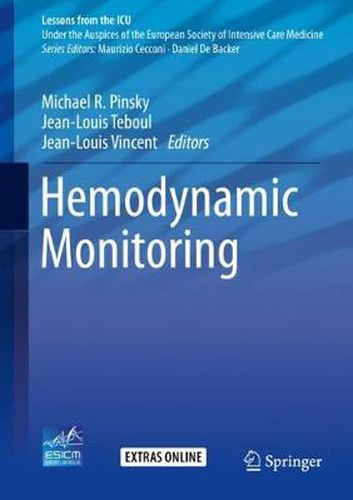Readings Newsletter
Become a Readings Member to make your shopping experience even easier.
Sign in or sign up for free!
You’re not far away from qualifying for FREE standard shipping within Australia
You’ve qualified for FREE standard shipping within Australia
The cart is loading…






This book, part of the European Society of Intensive Care Medicine textbook series, teaches readers how to use hemodynamic monitoring, an essential skill for today’s intensivists. It offers a valuable guide for beginners, as well as for experienced intensivists who want to hone their skills, helping both groups detect an inadequacy of perfusion and make the right choices to achieve the main goal of hemodynamic monitoring in the critically ill, i.e., to correctly assess the cardiovascular system and its response to tissue oxygen demands.
The book is divided into distinguished sections: from physiology to pathophysiology; clinical assessment and measurements; and clinical practice achievements including techniques, the basic goals in clinical practice as well as the more appropriate hemodynamic therapy to be applied in different conditions. All chapters use a learning-oriented style, with practical examples, key points and take home messages, helping readers quickly absorb the content and, at the same time, apply what they have learned in the clinical setting.
The European Society of Intensive Care Medicine has developed the Lessons from the ICU series with the vision of providing focused and state-of-the-art overviews of central topics in Intensive Care and optimal resources for clinicians working in Intensive Care.
$9.00 standard shipping within Australia
FREE standard shipping within Australia for orders over $100.00
Express & International shipping calculated at checkout
This book, part of the European Society of Intensive Care Medicine textbook series, teaches readers how to use hemodynamic monitoring, an essential skill for today’s intensivists. It offers a valuable guide for beginners, as well as for experienced intensivists who want to hone their skills, helping both groups detect an inadequacy of perfusion and make the right choices to achieve the main goal of hemodynamic monitoring in the critically ill, i.e., to correctly assess the cardiovascular system and its response to tissue oxygen demands.
The book is divided into distinguished sections: from physiology to pathophysiology; clinical assessment and measurements; and clinical practice achievements including techniques, the basic goals in clinical practice as well as the more appropriate hemodynamic therapy to be applied in different conditions. All chapters use a learning-oriented style, with practical examples, key points and take home messages, helping readers quickly absorb the content and, at the same time, apply what they have learned in the clinical setting.
The European Society of Intensive Care Medicine has developed the Lessons from the ICU series with the vision of providing focused and state-of-the-art overviews of central topics in Intensive Care and optimal resources for clinicians working in Intensive Care.